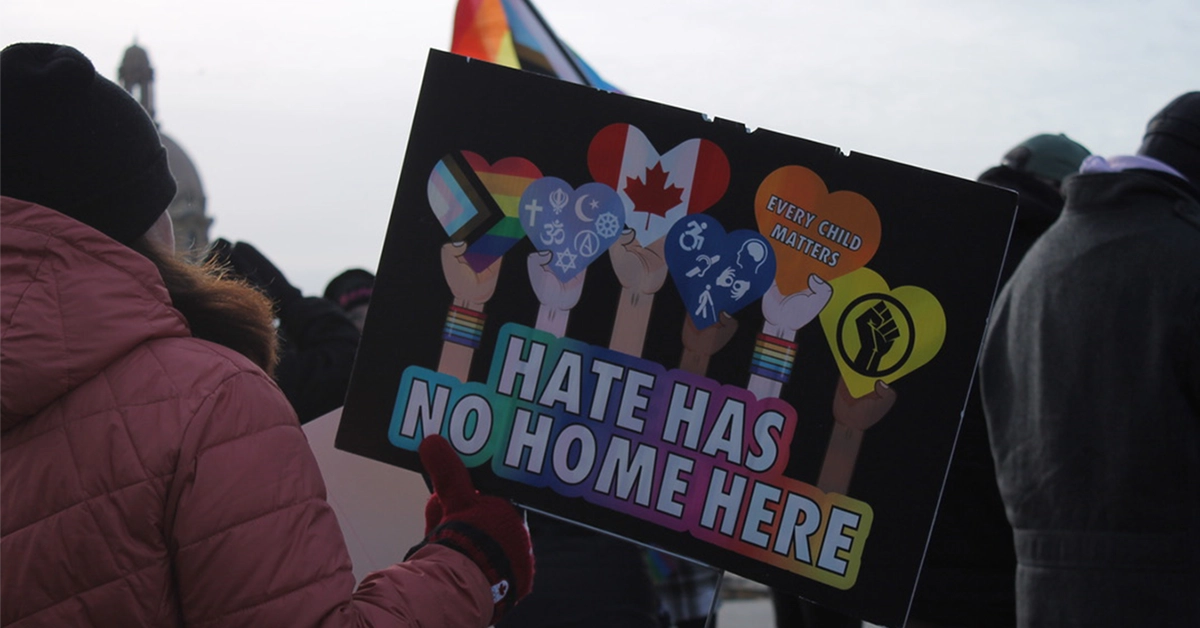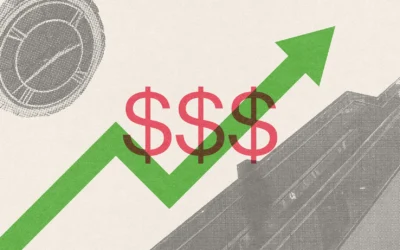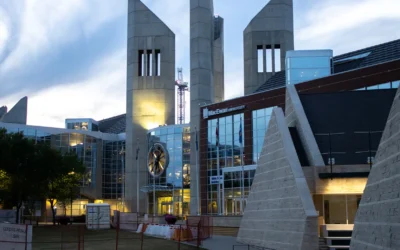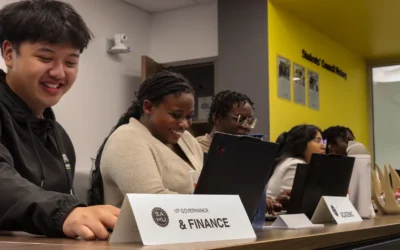Trans people are saying they had it rough, and today’s youth will have it worse.
All first-person perspectives in this story are those of writer Evan Watt.
It was getting better
When you are young, transgender, and terrified of yourself, the phrase “it gets better” doesn’t mean a thing. When you feel like everybody around you sees you as an abominable Other, and you agree with them, and the brightest vision you have for your future is one where you are finally left alone, hypothetical promises of a brighter existence in your future are laughable.
And then it does get better.
When I came out as transgender in high school, I was nowhere near ready to divulge this information to anyone but my friends. I introduced myself as a preferred name and requested that certain teachers whom I wholeheartedly trusted call me by that name. My personal concept of my gender and who I was was muddled and uncertain. All I knew was that the identity I was born with was a false one.
Because of the friends and authority figures in high school, I had the privilege of knowing I was given a safe and welcoming space that gave me the opportunity to explore who I was beyond my own internal agonizing. I was able to come to terms with myself in a way that made my eventual coming out to my family a possibility.
I am here today, in this form, because I was given a forum in which I was able to peacefully and quietly exist until I was ready to be loud about it. I was in a comparatively good situation compared to many of the stories within our community. I was at a school with a relatively large LGBTQ+ population, and I have the most incredible parents who have loved and supported me every step of the way.
Many of the other young transgender people I knew were in much more dangerous situations, where the possibility of “making it out” seemed less likely. For these people, a safe school community is a much more literal lifeline. More often than not, it is genuinely all that they have.
I am able to be the man I am today because of the support I received from adults who understood and cared about me. That critical branch of support that was extended to me and other young transgender people will now be regulated, policed, and reported on — under the first gender laws of their kind in this province.
The Alberta transgender policy
On Jan. 31, Alberta Premier Danielle Smith announced a package of sweeping changes and restrictions that will affect the province’s transgender youth. A seven-minute-and-27-second video detailing the new policy was uploaded to YouTube and Twitter.
The policy package is expected to come into effect in the fall and will directly affect three parts of trans youth life — healthcare, education, and sports. This is the first time in Alberta’s history when proposed legislation was directly targeted at transgender people who make up just 0.33 per cent of the population.
Access to hormone therapy like testosterone, estrogen, and puberty blockers will be restricted to children aged 16 and older. All gender surgery for youth aged 17 and under will be prohibited. Trans youth will be prevented from competing with children of the same gender — specifically trans girls.
Similarly to bills in New Brunswick and Saskatchewan, the policy will require schools to notify and get consent from parents of children aged 15 and younger who wish to change their names or pronouns at school. Parental consent isn’t required for children aged 16 and older, but parents must be notified.
Parents must also be notified and provide consent for schools before any instruction involving human sexuality or gender. All third-party materials on these topics must be approved by the government.
“I want every Albertan that identifies as transgender to know I care deeply about you, and I accept you as you are,” Smith says in the video. “It’s to those children and teens that I want to say just how much we love you and support you.”
In the weeks following the announcement, critics called the policy “dangerous” and “draconian.” Multiple legal organizations, including Egale Canada, plan to challenge the bill in court when it comes into effect. Amnesty International called the proposal an “alarming affront” to trans rights. Janis Irwin, the NDP MLA for Edmonton-Highlands, said the policies are, “founded on misinformation and target queer and trans youth.”
Supporters of the policy praised Smith for her “compassionate” language and careful, level-headed policy founded on research and policy seen in the U.K., Finland, and Sweden.
“What Alberta is doing is generally in line with the far more cautious approach to the gender transitioning of teenagers recently adopted by these European countries,” said David Staples, an Edmonton Journal columnist.
The premier did not comment when asked to provide a list of resources consulted for the legislation, but only that she has been consulting “widely on this issue for a long time.” The premier could not point to any incidence of “top” surgery performed on an Albertan under the age of 18 without parental consent. The premier did, however, reference multiple times that she had a non-binary family member.
The protests
Following the announcement of the “Alberta Transgender Policy,” a dry, droughted province ignited in protests.
Two hundred students walked out of their classes at Victoria School of the Arts. Singers and artists made musical protests in Churchill Square.
Hundreds gathered at Dr. Wilbert McIntyre Park on Feb. 3.
On Feb. 4, protestors took to the Alberta legislature grounds which were mostly blocked by construction.
The rally formed a circle where organizers, Indigenous leaders, teachers, academics, and human rights advocates took turns speaking. It had been four days since the government announced its proposed gender laws.
One man was detained by the RCMP after yelling, “fuck this gay shit.” A small group of counter-protestors who showed up said that they were in support of trans rights, but disagreed with this gathering. One counter-protestor said that it was because the NDP was using trans people “like pawns.”
One woman, a former Edmonton-area director for Take Back Alberta, was carrying a sign with some of Danielle Smith’s words from the social media video written in red.
“I’m merely here to listen so that I can better understand the perspective of the host of this event,” she said. After an argument with a protestor, she was accompanied by an RCMP officer for the remainder of the event.
At the rally, we met Ray, a transgender man who grew up in Edmonton but now lives in Jasper. He made the four-hour trek to Edmonton that morning to protest.
Ray said that he was there to protest the policy, calling it a “wedge issue” designed to distract and divide working-class people at the expense of a vulnerable population.
“The UCP has nothing to offer their voters,” he said and cited the cost-of-living crisis, flimsy electrical grid, and current drought as examples. “We are headed into the worst wildfire season ever… this is to turn people against each other and to distract from [these issues.]”
As an adult, Ray was “fumbled” around by the health-care system. He realized that he was trans at 19 years old, but it took 18 months before making any progress, and the mental toll on him was significant. It took another six years before Ray could transition, and by that time — gender-affirming care had improved significantly.
“I see younger people than me having it so much easier than I did when I was their age, and it makes me so happy to see that. It gives me so much hope for the future, and the thought of it getting taken away or limited makes me pretty mad.”
MacEwan students affected
I was luckier than Ray. When I started my adult life at MacEwan, I was able to be my true, genuine self for the first time in my life. I was so excited — so excited to be able to introduce myself without stress. To only be known by my real name. Nobody that I met knew anything about me or my past, and that’s the way I liked it. I grew accustomed to not only skirting around the fact of my identity, but flat-out lying about certain aspects of myself to give the impression that I was cisgender.
The past few months have taught me that someone in my position — a happy, healthy, and proud transgender man with a loud voice and a platform to display it — has an inherent duty to make the community a better and safer place than it was when I was younger and at my most vulnerable.
I was so scared of being hated, looked down on, and being made to feel like the Other again. I don’t want any of our transgender youth to feel like they are any less than those around them. The slight positive trajectory that I felt when we were on societal acceptance of transgender people is under attack. I am furious that these people — these children — are having freedoms that I had stripped from them.
The feeling bleeds into the rest of MacEwan. There are a number of on-campus supports and spaces for 2SLGBTQIA+ students, such as student groups like InQueeries, and spaces like the Centre for Sexual and Gender Diversity (GSGD).
Everyone we spoke with is terrified for the future of trans kids.
Less than 24 hours after the announcement, Jessica Scalzo from the CSGD, was out of breath. She said that morning has been a “flurry of activity,” and that she’s afraid of what will happen. At MacEwan, Scalzo said students were coming from schools where GSAs were the norm; they knew about support, but now the safety of that support is threatened.
“You don’t need to have lived the queer experience to know that these are wrong and that we need loud voices pushing back in an organized way,” said Scalzo.
A student who identifies as gender non-confirming and chooses to remain anonymous shares her fear and said that it isn’t safe to “out” kids to their parents.
“I was outed to my family, and it was horrible,” they say. “It’s the worst thing that can really happen because then you don’t know who to trust anymore.”
At home, their family forced them back into the closet, and while they are “out and proud” at MacEwan, their home life has become very difficult.
The folks from InQueeries share similar experiences and fears about what will happen.
“I remember what it was like to be a trans kid and growing up being absolutely terrified that if my family found out — they would kill me,” says Kane Olekson, InQueeries vice-president external. They grew up in a small Alberta where being queer was often met with violence.
When we met with four members of the InQueeries executive team, all of whom are gender-non-conforming, they described having difficult youths with limited safe spaces. Now, almost all of them want to become teachers, but are concerned that the policy will force them out of their career paths and that they’ll need parental permission every time they bring up their identities.
One school day in December, members of InQueeries strutted down the halls of Archbishop O’Leary Catholic High School in Edmonton while wearing pride flags and makeup — and while doing it proudly.
“People saw us from a mile away, and they were giving us glares. It was kind of scary. It felt like I was back in high school again,” said Olekson.
Despite receiving glares, the GSA that was hosting the presentation gave them a warm welcome. In that classroom, they chatted with high school kids, and gave a presentation about the life of queer university students. The children were ecstatic.
“‘The children loved you,’ ‘We loved you,’ ‘You taught us so much,’ ‘Please come again,’” Olekson recalled the teachers telling them.
Despite having been invited to many GSAs, and putting out an open call to do so again, InQueeries hasn’t heard anything from any schools since the policy announcement.
The group remains positive that they are making a difference, but even as adults, they see members of their community struggling to receive gender-affirming care.
“Half of my friends who were on HRT two years ago are now off of it completely because the doctors and the funding is gone,” said Olekson, who has been off of testosterone since an NDP-funded clinic on Whyte Ave closed.
The policy won’t work, Olekson said.
“These youth are going to turn to black market HRT. They’re going to turn to the over-the-counter testosterone pills you can buy from Safeway that are only supposed to be for cis men who are also taking testosterone gel that is extremely damaging.”
“Policies like this only make sneakier kids,” said Krain Embers, the vice-president for InQueeries.
I am sick and tired of transitioning being misunderstood and miscommunicated by misinformed cisgender people who don’t care enough to learn,” they said. “I do not care about cisgender people’s opinions on this anymore. I am not only disgusted with the UCP, but with the journalists who have done what is, frankly, a sloppy, careless job in their coverage of this issue.”
“Taken as a whole, these policies are fairly moderate, balanced and uncontroversial,” said National Post columnist Adam Zivo.
“Multiple studies have found that most kids who are confused or distressed about their sex end up realizing they’re gay — nearly two-thirds in a 2021 study of boys. Yet if they go down a transgender road, they’ll lose sight of who they really are,” said endocrinologist Dr. Roy Eappen in a Calgary Herald column.
It took me three doctors and three months on puberty blockers to get the okay. for me to start on the lowest dose of testosterone that they could give me. I was 17.
Even the media that claims to be on the side of the transgender community seems afraid of us. We are not being treated like humans, but like poor, sick puppies that can’t speak for themselves.
“I desperately hope that well-meaning cis journalists take the lead from (and listen to) trans people in the coming weeks covering Alberta,” journalist Mel Woods tweeted. “There are so few of us openly trans journalists working in Canada. And it’s frustrating to watch people get it wrong, or stumble through.”
Real transgender Albertans and their lived experiences are being ignored in favour of a vastly cisgender media that considers the transgender community a topic that’s easy to Google.
“A lot of the policy that I saw is either pointless virtue signalling because most of the medical stuff in it is already similar to the restrictions that are in place and the parts that aren’t are things that have been proven to harm kids,” said Autumn MacGregor, a MacEwan student and transgender woman.
“I know that a lot of people have concerns about the long-term safety of hormone therapy and blockers, but the blockers have been used for about 40 years or so as long as people aren’t on them indefinitely, it does not have any lasting effects that I am aware of,” she said.
Smith and her proponents will have you believe that medical transition is some sketchy, ill-researched science. Further than that, they intend to twist the very idea of gender experimentation and expression into something perverse. The conservatives attempt to accomplish this by creating a false narrative around the community. A narrative that is, once again, easily dismantled when one simply speaks to members of the community.
“… No youth is getting reassignment surgery or gender-affirming surgeries. As an adult, to have bottom surgery, you even have to leave the province. So, it’s just kind of like this rhetoric that they’re trying to unite the conservatives against our community and that’s not okay,” explained Natalie Plant, a member of the LGBTQ+ community who attended the Feb. 4 rally at the legislature.
The reality for trans youth
The Alberta Civil Liberties Research Centre states that 43 per cent of trans-identified youth will attempt suicide. A 2020 report titled Understanding LGBTQ2S Youth Homelessness In York Region suggests that as many as one in five homeless youth who identify as LGBTQ+ and are more likely than other youth to be out on the streets. The 2017 Canadian Trans Youth Health Survey found that almost 65 per cent of transgender people in Alberta between the ages of 19 and 25 have considered suicide at some point in their lives.
If you are a member of the community, it’s likely that these statistics are more than just numbers to you, and instead remind you of a certain face, a name, or a memory of one of us who’s not here anymore.
The fact is, more than enough people have brought these numbers to Smith’s attention, and all she can say is, “we love you.”
Embers calls it, “a classic case of love-bombing.”
This legislation will increase these aforementioned statistics. That is the truth, and there is no way around it. These policies can and will kill transgender children. Families will be torn apart in the worst way imaginable.
Again, I was lucky. Trans people should not have to rely on being lucky in order to be happy and live good lives. The work that is being done by the UCP is a step in the direction of preventing young trans people from living their lives at all.
It is important now more than ever for transgender people to know that they are valued, worthy of being loved, and treated with kindness. We will not stand for this dehumanization. Transgender youth are vulnerable children who do not deserve to be put under political attack. We owe it to these children to protect them and give them hope for a future in which they can thrive.
Photos by Amanda Erickson





0 Comments